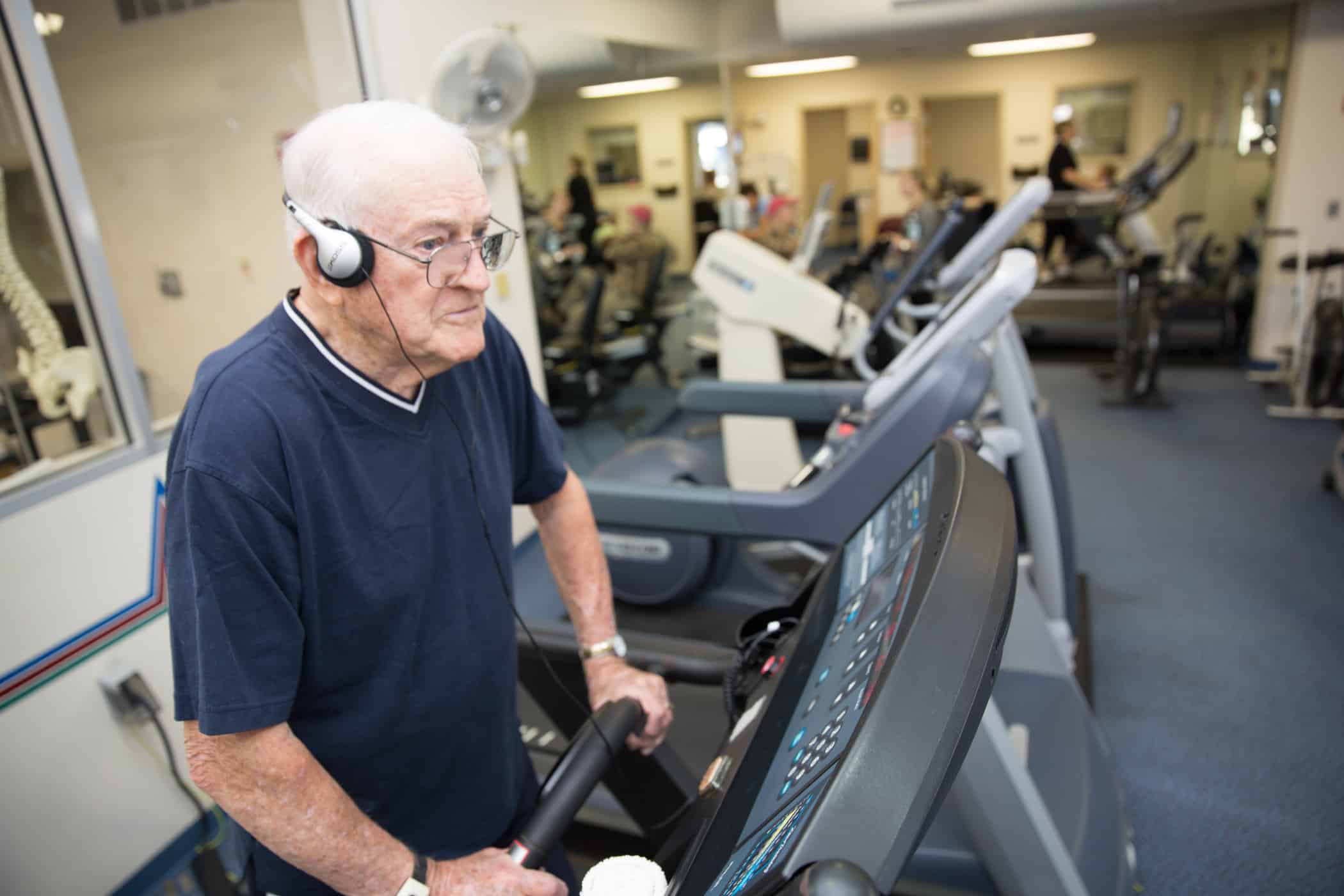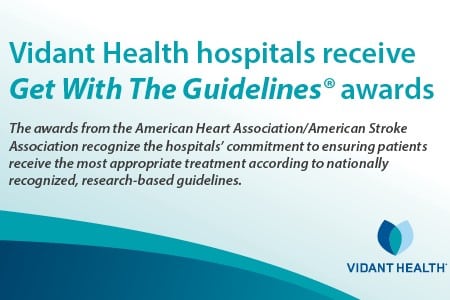Roanoke Rapids, N.C. – February 10, 2022 – Vidant North Hospital is pleased to announce its Heart & Vascular Care will move into a newly renovated, expanded clinic location near the hospital on Feb. 14, 2022. The upgraded facility allows Vidant Heart & Vascular Care to provide multiple advanced clinical services, including thoracic surgery, vascular surgery, cardiac electrophysiology and pediatric cardiology, to Roanoke Rapids at one convenient location.
“The opening of our renovated clinic aligns with National Heart Month, and a very symbolic day we associate with matters of the heart, Valentine’s Day,” said Dr. Kenneth Robert, regional medical director of ambulatory services, Vidant North Hospital. ”Vidant Heart & Vascular Care will help support a focus on raising awareness for heart disease, screenings, education and promotion of access of care close to home through a connected system of care.”

The addition of new clinical providers expands the ability for more patients to be examined quickly in the event of cardiovascular needs. A local team including a cardiologist, interventional cardiologist and an adult nurse practitioner will be on-site, and a team of outreach providers will be available through specific scheduled times. This outreach team includes an electrophysiologist, scheduled once a week and typically scheduled by referral, a thoracic surgeon, scheduled once a week by referral and a pediatric cardiologist, scheduled once a month by appointment.
“This opportunity allows cardiac providers to better serve the community in a meaningful way and to build upon the relationships with patients and their loved ones,” said Dr. Brian Cabarrus, Vidant cardiologist. “This upgrade in clinical space and greater access to cardiac and peripheral diagnostics helps enhance the patient and team member experiences.”
The services and accessibility of quality care offered by Vidant Heart & Vascular Care – Roanoke Rapids ties directly into Vidant and the future ECU Health’s commitment to improve health outcomes in communities across eastern North Carolina.
“This is an important day for Vidant North Hospital and the communities it serves,” said Jason Harrell, president, Vidant North. “Providing high-quality, comprehensive heart and vascular care close to home is an important part of how we meet our mission to improve the health and well-being of eastern North Carolina.”
Vidant Heart & Vascular Care – Roanoke Rapids will be open weekdays, Monday through Friday, from 8 a.m. to 5 p.m. each day. The clinic will offer care for patients that do not have a primary care provider and will connect them with one after their initial visit.
The new location for Vidant Heart & Vascular Care – Roanoke Rapids is 220 Smith Church Road, Roanoke Rapids, NC, 27870. For medical referrals, appointments and consultations, call 252-537-9268.
Greenville, N.C. – October 27, 2021 – ECU Health Medical Center (VMC) is proud to announce it has received re-certification for its cardiac and pulmonary rehabilitation program by the American Association of Cardiovascular and Pulmonary Rehabilitation (AACVPR). This is the fourth recertification for VMC by the AACVPR since 2012, and it recognizes VMC’s commitment to improving the quality of life of patients by enhancing standards of care.
To earn this certification, VMC’s cardiovascular and pulmonary rehabilitation program participated in an application process that required extensive documentation of the program’s practices. Each program’s application is reviewed by the AACVPR Program Certification Committee, and certification is awarded by the AACVPR Board of Directors.

For VMC, part of the application process included the submission of individual treatment plans that were evaluated for personalizing the care of patients and documenting patients’ rehabilitation for improvements in health.
“This outcome-based process with performance measurements shows more meaningful results in how we are making a positive impact on the lives of our patients,” said Stacey Greenway, director of cardiovascular disease management programs at VMC.
For patients in the cardiac and pulmonary rehabilitation program, it is the compassion of the staff that is a big part of their success. During rehabilitation, cardiac and pulmonary team members focus on the things the patients can control in order to improve their health and get them back to their daily activities. When patients take part in these rehabilitation programs, there is a 58 percent risk reduction of having a future cardiac or pulmonary episode.
“One of the most important benefits to patients participating in our cardiac and pulmonary rehabilitation program is learning how to become more engaged partners with their health care team,” Dr. Noel Peterson, cardiologist at Vidant Health, said. “We are pleased to once again receive this recognition of continued excellence in comprehensive care for our patients receiving cardiac and pulmonary rehabilitation.”
Cardiac rehabilitation is a combination of medical care and counseling to improve cardiovascular health after a heart attack, heart failure, angioplasty or heart surgery has taken place. It may include exercise counseling and training, lifestyle education (e.g., nutrition and reducing risk factors) and efforts to manage stress. Cardiac rehabilitation eases patients into heart-healthy exercises, nutrition education and education on how to manage risk factors such as stress.
Pulmonary rehabilitation can help reduce and control breathing difficulties and other symptoms of lung disease and benefit conditions including chronic obstructive pulmonary disease (COPD), emphysema, pulmonary hypertension and sarcoidosis. Pulmonary rehabilitation includes education and exercise to manage chronic lung disease with less shortness of breath.
“Factors like learning how to be more proactive about health and providing programs that demonstrate the highest standards of best practices makes a significant impact on the lives of our patients,” said Greenway. “The diligent work of our VMC cardiac and pulmonary rehabilitation team members recognized by the AACVPR is another example of how we are providing quality health care to improve the health and well-being of eastern North Carolina.”
On the east coast, and in eastern North Carolina specifically, we frequently see many of the risk factors that can cause afib.
Dr. Adam Clark, cardiologist and director of the Cardiac Electrophysiology Lab at ECU Health Medical Center (VMC), discussed this prevalent issue in a recent radio interview.
He said the most potent and unchangeable risk factor for afib is age. Other risk factors include high blood pressure, sleep apnea, underlying heart disease, and other chronic conditions including thyroid problems, diabetes and asthma. The most important modifiable risk factor for afib is obesity and sleep apnea.
“Afib increases the risk of hospitalization, death and heart failure,” Dr. Clark said. “If the heart rate is not controlled, it can lead to heart failure. It increases the risk of stroke and causes one in seven strokes and increases your stroke risk by four to five times.”
Dr. Clark said the entire east coast and the Midwest have the highest rates of afib in the country and the world. In eastern North Carolina, we are at particular risk for a number of reasons, including a population with higher rates of obesity, hypertension and diabetes.
Knowing the signs of afib is important to identifying the disease as early as possible.
“The most common signs of afib are an irregular heartbeat, palpitations of the heart, lightheadedness, extreme fatigue, shortness of breath and chest pain,” Dr. Clark said.
Dr. Clark said the main test to identify afib is a simple AKG or Electrocardiogram which your primary care provider can take. There are wearable and implantable monitors that can monitor your heartbeat for years at a time as well. Screenings for afib often are what he calls “opportunistic screening.”
“This means when you go in for your regular check with your primary care physician, they feel your pulse and listen to your heart,” Dr. Clark said. “If it’s irregular, they’ll get an EKG. This should be done in every patient over 65.”
Dr. Clark said limiting your risk factors is the most important thing you can do to avoid afib, including blood pressure control, staying active, managing sleep apnea and limiting alcohol intake. He added that half of afib is asymptomatic and even without feeling it, your stroke risk can be significantly increased. Talk to your doctor about screening for afib.
VMC joins TAKEHeart program to expand access to cardiac rehabilitation services
VMC is participating in TAKEHeart, a national initiative funded by the Agency for Healthcare Research and Quality, to make a positive impact on the lives of patients by encouraging greater participation in cardiac rehabilitation. The initiative will help easily connect patients with cardiac rehabilitations services to improve their heart health and reduce the risk of future heart issues. As a TAKEHeart partner, VMC cardiac and pulmonary team members will receive advanced training, coaching and technical support as well as shared learning about cardiac rehabilitation best practices.
“Patients are more likely to survive an acute heart episode when they engage in cardiac rehabilitation,” said Stacey Greenway, director of cardiovascular disease management programs at VMC. “We know that only a small percentage of patients complete cardiac rehabilitation. Participating in TAKEHeart means bringing best practices and strategies in cardiac rehabilitation to Vidant and eastern North Carolina to improve outcomes for patients suffering from a cardiac episode.”
Read more about the TakeHEART program.
Visit the Heart & Vascular Care page to learn more about the programs and services Vidant offers.
 Greenville, N.C. – June 30, 2021 – ECU Health Medical Center (VMC) is participating in TAKEHeart, a national initiative funded by the Agency for Healthcare Research and Quality, to make a positive impact on the lives of patients by encouraging greater participation in cardiac rehabilitation. The initiative will help easily connect patients with cardiac rehabilitations services to improve their heart health and reduce the risk of future heart issues. As a TAKEHeart partner, VMC cardiac and pulmonary team members will receive advanced training, coaching and technical support as well as shared learning about cardiac rehabilitation best practices.
Greenville, N.C. – June 30, 2021 – ECU Health Medical Center (VMC) is participating in TAKEHeart, a national initiative funded by the Agency for Healthcare Research and Quality, to make a positive impact on the lives of patients by encouraging greater participation in cardiac rehabilitation. The initiative will help easily connect patients with cardiac rehabilitations services to improve their heart health and reduce the risk of future heart issues. As a TAKEHeart partner, VMC cardiac and pulmonary team members will receive advanced training, coaching and technical support as well as shared learning about cardiac rehabilitation best practices.
“Patients are more likely to survive an acute heart episode when they engage in cardiac rehabilitation,” said Stacey Greenway, director of cardiovascular disease management programs at VMC. “We know that only a small percentage of patients complete cardiac rehabilitation. Participating in TAKEHeart means bringing best practices and strategies in cardiac rehabilitation to Vidant and eastern North Carolina to improve outcomes for patients suffering from a cardiac episode.”
Approximately 1 million Americans have a coronary event or surgery each year, but only 20 percent are referred to cardiac rehabilitation. Among Medicare-eligible heart attack patients, only 6.5 percent complete the recommended cardiac rehabilitation sessions. Cardiac rehabilitation eases patients into heart-healthy exercises, nutrition education and education on how to manage risk factors such as stress. People who have cardiac rehabilitation after a heart episode have lower mortality rates, fewer hospital admissions and readmissions and higher quality of life.
The eastern North Carolina population faces a disproportionate risk of heart disease. According to the Agency for Healthcare Research and Quality, patients who complete cardiac rehabilitation sessions have a 47 percent lower risk of death and a 31 percent lower risk of a heart attack than those who attend only one session.
“One of the most important benefits to patients participating in a cardiac rehabilitation program is learning how to take charge of their own health and become more engaged partners with their health care team,” Dr. Noel Peterson, cardiologist at Vidant Health, said. “Our care teams are excited to continue to partner with patients and provide advanced cardiac rehabilitation services to eastern North Carolina.”
Cardiac rehabilitation is a combination of medical care and counseling to improve cardiovascular health after a heart attack, heart failure, angioplasty, or heart surgery has taken place. It may include exercise counseling and training, lifestyle education (e.g., nutrition and reducing risk factors) and efforts to manage stress.
“It is broader than just diet and exercise,” said Greenway. “Factors like learning how to be more proactive about health and providing better access to resources can make an impact. Living in a rural area can create a barrier to resources, which makes these initiatives so critical to this region. By providing improved access to rehabilitation services, we can help patients find creative ways to improve their heart health through ongoing education and lifestyle changes.”
There are key factors that impact heart health that everyone needs to be aware of to maintain a healthy cardiovascular system. These include monitoring blood pressure, knowing your cholesterol and getting enough exercise.
High blood pressure, also referred to as hypertension, occurs when the pressure of blood flowing through your blood vessels is consistently too high. According to the American Heart Association, nearly half of American adults have high blood pressure and many do not even know it.
Dr. Blase A. Carabello, chief of cardiology, Brody School of Medicine at ECU and ECU Health Medical Center, said, “High blood pressure is often a symptomless ‘silent killer’ because there are often no noticeable symptoms that accompany this condition. The best way to know if your blood pressure is in a healthy range is to get your blood pressure checked and monitor your blood pressure numbers regularly.”
Cholesterol levels can play a key role in heart health. It comes from two sources: the liver, which makes all the cholesterol you need, and the rest comes from foods from animals. Cholesterol circulates in the blood and as the amount of it increases in your blood, so too does the risk of cardiovascular diseases such as heart disease and stroke. When it comes to cholesterol, remember to check, change and control.
Another key factor influencing heart health is atrial fibrillation or “afib,” a quivering or irregular heartbeat that can lead to blood clots, stroke and heart failure and a shortened life span. Typically, people who have one or more conditions including high blood pressure, sleep apnea, underlying heart disease, and other chronic conditions including thyroid problems, diabetes and asthma may be at risk for atrial fibrillation. However, the single most important modifiable risk factor for afib is obesity.
The treatment goals of atrial fibrillation begin with diagnosis through in-depth examination from a physician. Based upon the diagnosis, providers may offer a variety of options including medication that usually entails the use of blood thinners, nonsurgical procedures, including electrical cardioversion to reset the heart to a normal rhythm and procedures that can block the area of the heart where blood clots form if patients are unable to take blood thinners.
“Being proactive about your heart health is the best way to be aware of potential problems,” said Dr. Carabello. “Eating a healthy diet, maintaining a healthy weight and being physically active can make a positive impact on blood pressure, cholesterol and atrial fibrillation, which will help maintain good heart health. Also, seeing your provider for screenings and check-ups is key to preventing problems before they arise.”
Even though the pandemic continues to make an impact on daily life in eastern North Carolina, Dr. Carabello encourages community members to continue to seek medical attention and to be knowledgeable about the procedures in place to make patients as safe as possible.
He said, “Heart disease did not take a break during the pandemic and any negative heart condition needs to be addressed in its earliest stages when the widest variety of treatments are available.”
For those who have experienced a major cardiac event, Vidant offers a Cardiovascular and Pulmonary Rehabilitation Program to help create a path forward. A team of respiratory therapists, registered nurses, exercise professionals, dietitians and a medical director guide patients through a program focused on exercise, nutrition and behavior modification to prepare and equip those in the program to continue physical activity and healthy lifestyle changes.
For more information about cardiovascular resources at Vidant Health, including treatments, screenings and technologies, visit VidantHealth.com/Heart-Vascular.


